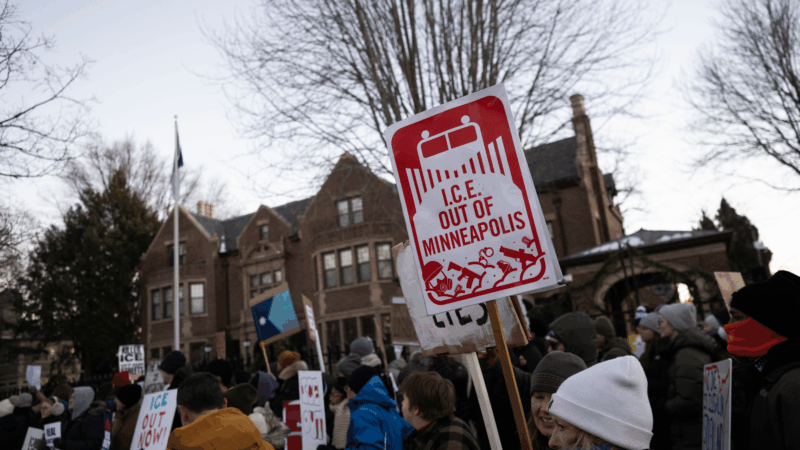Birmingham Civil Rights Institute Commemorates 50th Anniversary of the Civil Rights Act
Panelists take part in a discussion on the 50th anniversary of the Civil Rights Act of 1964. Photo by Rebecca Farmer.
July 2, 2014, is the 50th anniversary of the day Lyndon B Johnson signed the Civil Rights Act of 1964 into law. The legislation prohibits discrimination on the basis of race, sex, color, religion and national origin. Additionally, the act ended discrimination in schools and other public places, and outlawed unequal voter registration policies.
The Birmingham Civil Rights Institute hosted an event this morning discussing how the Civil Rights Act continues to impact Americans 50 years later. Among the panelists were Joyce White Vance, U.S. Attorney for the Northern District; Michael German, Alabama Director for the U.S. Department of Housing and Urban Development; Delner Franklin-Thomas, District Director of the Equal Employment Opportunity Commission and Richard Schwein, FBI Special Agent in Charge for the Birmingham Division.
Panelists generally agreed that Alabama has come a long way since Johnson signed the Civil Rights Act of 1964. Fifty years ago, discrimination was widespread across the country, with Alabama being a central battleground in the Civil Rights struggle.
Delner Franklin-Thomas is District Director of the Equal Employment Opportunity Commission. She said she’s thankful for Birmingham’s place in Civil Rights history.
“I’m proud of the legacy that Birmingham has certainly the demonstrations, what happened at the University of Alabama all of that led to the employment provisions under title seven of the Civil Rights Act of 1964,” said Franklin-Thomas.
The events Franklin-Thomas mentions are well known to students of Civil Rights history.
These include the May 1963 demonstration at Kelly Ingram Park (formally known as West Park), where the Southern Christian Leadership Conference (SCLC) held a massive protest campaign. It was an assembly point for participants in what SCLC called Project “C,” with the C standing for confrontation. It included sit-ins, boycotts, marches, and jailings, all designed to end segregation in Birmingham.
During this attack, Martin Luther King was arrested and spent three days in jail. There, he penned his famous “Letter from the Birmingham Jail.”
Later that year, on September 15, a bomb went off at the 16th Street Baptist Church, killing 4 young girls.
Despite the progress of the last 50 years, Franklin-Thomas told the crowd “We still have work to do.”
The panelists at the discussion also said that, in today’s society, discrimination is the U.S. extends beyond just race or gender.
“Civil Rights is this nation’s unfinished business,” said Joyce White Vance, U.S. Attorney for the Northern District of Alabama. “Both the potential in the 1964 act — which we have to work hard everyday to continue to guarantee — and then beyond the act. We have to continually evolve our definition of who is part of the civil rights community.”
Panelists discussed contemporary discrimination issues ranging from the discrimination faced by the LGBT community to human trafficking to guaranteeing the civil rights of the recently released inmates.
Panelists concluded that citizens have a lot of work to do to move Birmingham forward, but they are all optimistic that we are moving in a positive direction.
Jordan Stolz opens his bid for 4 golds by winning the 1,000 meters in speedskating
Stolz received his gold for winning the men's 1,000 meters at the Milan Cortina Games in an Olympic-record time thanks to a blistering closing stretch. Now Stolz will hope to add to his collection of trophies.
How the FBI might have gotten inaccessible camera footage from Nancy Guthrie’s house
Last week, law enforcement said video footage from Nancy Guthrie's doorbell camera was overwritten. But the FBI has since released footage as Guthrie still has not been found.
How to hone your ‘friendship intuition’
Friendship expert Kat Vellos shares tips on how to make a new friendship stick, including what to do together, how often to hang out — and what to do if the vibes just aren't there.
US Colleges received more than $5 billion in foreign gifts, contracts in 2025
New data from the U.S. Education Department show the extent of international gifts and contracts to colleges and universities.
Free speech lawsuits mount after Charlie Kirk assassination
Months after the killing of Charlie Kirk, a growing number of lawsuits by people claim they were illegally punished, fired and even arrested for making negative comments about Kirk.
Swing voters in Arizona say they want to see ICE reformed
Concerns about the tactics of federal immigration agents remain front of mind for some key voters who supported President Trump in 2024.







